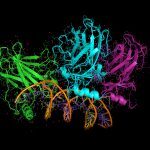Lien vers Pubmed [PMID] – 28860517
Lien DOI – 1028110.1038/s41598-017-09926-3
Sci Rep 2017 Aug; 7(1): 10281
The second messenger c-di-GMP regulates the switch between motile and sessile bacterial lifestyles. A general feature of c-di-GMP metabolism is the presence of a surprisingly large number of genes coding for diguanylate cyclases and phosphodiesterases, the enzymes responsible for its synthesis and degradation respectively. However, the physiological relevance of this apparent redundancy is not clear, emphasizing the need for investigating the functions of each of these enzymes. Here we focused on the phosphodiesterase PA2133 from Pseudomonas aeruginosa, an important opportunistic pathogen. We phenotypically characterized P. aeruginosa strain K overexpressing PA2133 or its inactive mutant. We showed that biofilm formation and motility are severely impaired by overexpression of PA2133. Our quantitative proteomic approach applied to the membrane and exoprotein fractions revealed that proteins involved in three processes were mostly affected: flagellar motility, type III secretion system and chemotaxis. While inhibition of biofilm formation can be ascribed to the phosphodiesterase activity of PA2133, down-regulation of flagellar, chemotaxis, and type III secretion system proteins is independent of this enzymatic activity. Based on these unexpected effects of PA2133, we propose to rename this gene product FcsR, for Flagellar, chemotaxis and type III secretion system Regulator.


